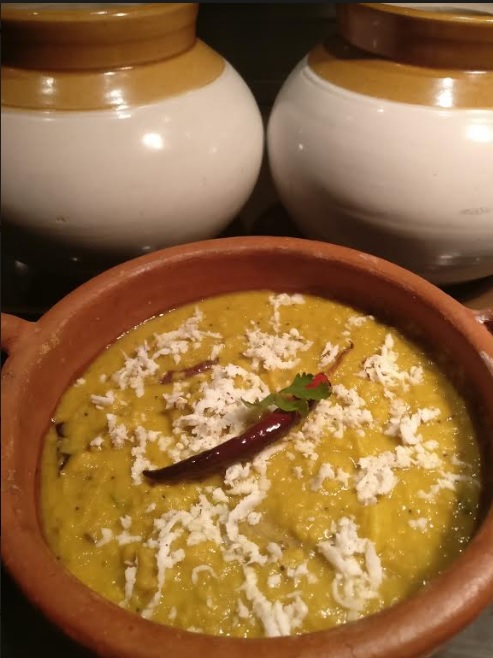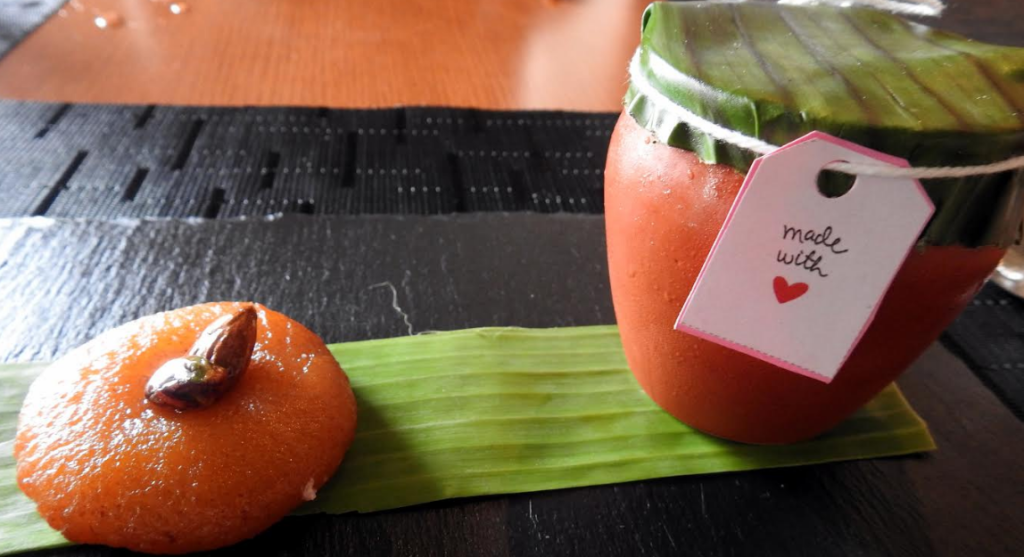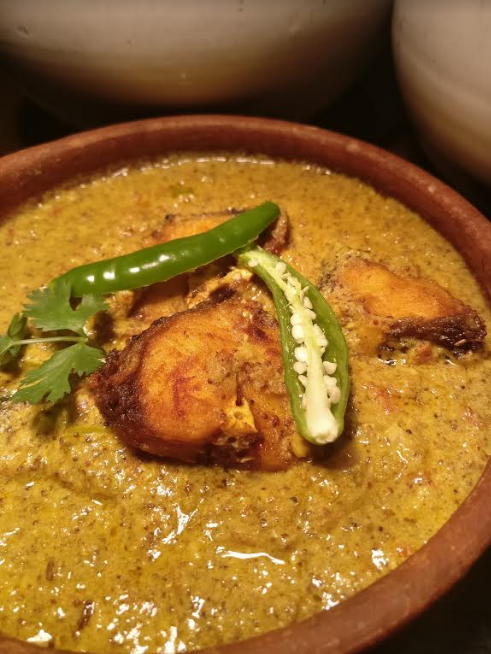The plate on my table looked enticing – well that’s the word that came into my mind almost instantly when I saw the thaali laid in front of me. It was the first time I was trying out Odia food and I had a plate full of veggies, rice, kanika, a sweet rice dish, puri, dal, curd based dishes and desserts. The best part is that eggplant is used quite extensively and being my favourite, I took an instant liking to the food. Incidentally, Odia cuisine is said to be one of the oldest cuisines in the country and the interesting fact about this food is that every single dish on the plate has a logical reason for being there as it aids wholesome wellness of both the body and mind. According to Ashis Rout, Executive Chef, Intercontinental Chennai Mahabalipuram Resort, “compared to other regional Indian cuisine, Odia cuisine uses less oil and is less spicy and yet it is very flavourful. Rice is the staple food of this region and mustard oil is used extensively as the cooking medium. In temples ghee is the preferred medium and yoghurt is used in dishes. The simplicity, usage of the local ingredients, simple cooking methods and medicinal values makes Odiya cuisine distinct.”
Regional Flavours
Odissa has a very strong focus on vegetarian food in places like Puri which is the center of the famed Jaganath Puri temple and the food is influenced with temple culture. Said to be one of the largest kitchen’s in India, food served at the temple as Prasad is always different and you will rarely find the same items being repeated. “Special dishes like Dalma (a lentil and vegetable stew, Besara (a vegetable cooked with grounded mustard), Saaga (a stir fried green leafy vegetables), Kanika (a sweet rice flavoured with cinnamon and lots of dry fruits and Dahi Baingana (an eggplant seasoned with curry leaf and tempered with yoghurt) are some trademark dishes of the region,” says Chef Ashis. In other parts of Odissa non vegetarian food has a strong influence. In Sambalpur, the Bamboo Mutton (lamb marinated and forced inside bamboo and slow cooked on wood fire), Machha Besara (fish cooked with raw banana and potato in a mustard gravy, Potala chungudi (pointed gourd filled with shrimps and cooked) Patra poda (mini shrimps wrapped in green leaf, cooked on wood fire and then mashed with mustard oil, chilly and onion) are well known.
The Differentiator
Ingredients in Odiya cuisine plays an important role as the cooking methods are simple and as there is no use of heavy spices in the food every dish has its own aroma and identity. “The ingredients used in Odia cuisine include plantain, jack fruit, raw papaya, vegetables from the gourd family which grow here in a large quantities as well as extensive varieties of leafy green vegetables. The focus is to cook with a lot of locally grown green vegetables and variation of lentils like toor dal, whole green moong and masoor,” opines Chef Ashis. The curries are garnished with dried raw mango powder and tamarind and coconut is used in several dishes. Panch Phutana is a blend of five spices that is widely used in Odia cuisine and contains mustard, cumin, fenugreek, aniseed and kalonji (onion seeds). Garlic and onion are used but avoided in temple environment and turmeric and red chillies are commonly used.
Sweet Nothings
Desserts are the most important aspect of an Odiya meal. Odissa is known for its large range of sweets that are mainly made from cow milk and fresh chhena (cheese made from milk). In fact the state has a tradition where its denizens give sweets when they visit a friend or relatives place. This apart, it is customary to offer lots of sweets to God in temples as well. Kheeri, a milk and rice pudding and Chhena poda – the famous cheese cake made from fresh cheese flavoured with cardamom and baked with charcoal which is not found anywhere in India, are well known desserts. Also Rasagolla the well known dessert has its origins in Odissa and has its own taste in West Bengal. Khaja, a puff pastry which is deep fried and soaked in sugar syrup and Kheera, a rich dessert made from reduced milk, fresh cheese and flavoured with cardamom are some other well known desserts. So if you are looking for a meal that is wholesome and yet healthy check out Odia cuisine.
Here are a couple of recipes from Chef Ashis.

DALMA
Ingredients
Potato 100 grams
Brinjal 75 grams
Tomato 80 grams
Onion 100 grams
Mustard seeds 15 grams
Cumin seeds 15 grams
Turmeric 15 grams
Red chilli dry 2 grams
Oil 15 grams
Salt 10 grams
Toor dal 150 grams
Raw banana 100 grams
Ginger 10 grams
Green chilli 10 grams
Method:
Cut all the vegetables. Wash the dal well and add the dal, vegetables, chopped tomatoes, coconut, 2 cups of water into a presser cooker. Add salt and turmeric to taste and cook on a medium flame till one whistle and immediately switch off the flame. Dry roast cumin seeds and for a couple of minutes, cool and grind. Keep aside. In a pan heat the oil and ghee, add mustard seeds, cumin seeds, green chilli, grated ginger and onion. Fry until the onion turns golden brown. Add the dal and vegetable mixture from pressure cooker. Then add roasted cumin powder and mix well. Allow the mixture boil for 5 minutes to mix all the flavoures. Serve hot with chapatti or rice. You can add vegetables of all kinds to your taste to Dalma including lauki, jackfruit seeds, beans and raw papaya.
MACHHA BASERA
Ingredients:
Mustard seeds 0.5 teaspoon
Garlic 4 cloves
Onion 60 grams
Green chillis 2
Yoghurt 40 grams
Turmeric powder 15 grams
Chilli powder 15 grams
Salt 10 grams
Sugar 20 grams
Mustard oil 15 milliliters
Rohu fish 500 grams
Ginger garlic paste 40 grams
Method:
Make a fine powder of the mustard seeds and then add garlic, onion, green chillies and some water to make a fine paste. Marinate the fish with the mustard paste, yogurt, turmeric powder, red chilli powder, a pinch of sugar and salt. Add 2 teaspoon of mustard oil (preferred) and allow to marinate in the refrigerator for a minimum of 30 minutes (the longer, the better). When ready to cook, pour the marinated mixture into the pan and let it simmer for 4-5 minutes. Adjust the water content depending on the consistency of the gravy needed. For the tempering, heat the oil, add the mustard seeds, curry leaves, finely minced garlic and add the tempering to the fish, once the mustard seeds start to pop. The oil starts to float once the fish is done. Serve hot.
This story appeared in the 21st Jan 2017 issue of Deccan Herald Living here.
To read my other stories on theIntercontinental Chennai Mahabalipuram Resort click here and here.




Superb !
The way it was portrayed was simply stunning ….
People who will read the above story will definitely try Oriya food .
Thanks .
Bindu Gopal Rao …?
Thanks Chef Ajay. It came out today because you helped me with the pic in spite of being your day off. Will never forget. I hope I can host you for a meal in Bangalore soon!
Dear bindu, it’s an amazing article, a heartfelt thank you for all your effort. You have portrayed oriya cuisine so nicely. I am sure people will love it. Thanks a ton. Thank you ajay. Looking forward to see you back some time
Dear Chef,
Thank you hope to see you soon!